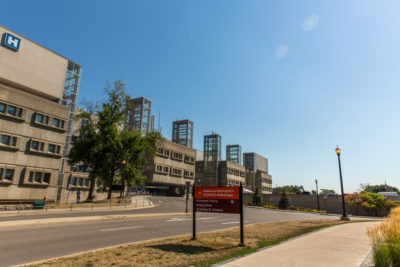Clinical neuropsychological services are available to select children and teens who have a neurological condition, or who have received trauma, surgery, or treatment that may have affected brain development. Only some children/teens from designated clinics/physicians area seen given the highly specialized nature of this service.
What to Bring
- Your child’s Health Card. The Ministry of Health and Long Term Care requires us to validate your health card at every clinic visit
- Assistive Aids (e.g. glasses or hearing aid)
- Educational documentation (e.g. individual education plans, reports cards, etc.)
- Previous psychoeducational, psychological or neuropsychological assessment reports
- Reports from services or therapists involved (e.g. Occupational Therapy, Physiotherapy, Speech and Language pathology, Behaviour Therapy, etc.)
- Any notes or questions that you may have
- List of current medications and allergies
When you arrive, please check-in at the reception desk. The Business Clerk will register you in the electronic system so that your team will know that you have arrived.
Children referred through either the Oncology Service or Medical/Surgical Teams will report to Desk 2 at the 2G Clinic. You will receive a letter in the mail prior to your appointment containing more details.
Note: If your child is ill with any antibiotic resistant organism, MRSA, a communicable disease (such as Chicken Pox), or a respiratory infection, please notify reception staff prior to your scheduled appointment.
Team Members
The interdisciplinary team includes an oncologist, medical/surgical physician, and psychometrists.
How can a neuropsychological assessment help my child?
A neuropsychological assessment takes a “picture” of the many thinking and learning parts of the brain, including intellectual development, memory, attentional control, problem-solving, behaviour and many other areas.
A Neuropsychologist is specially trained to understand the various cognitive abilities and relate them to brain development and the child’s neurological condition. A neuropsychological assessment can:
- Assist in the diagnosis of learning and behaviour disorders as they relate to medical treatments (e.g. cranial radiation, CNS chemotherapy), neurological conditions (e.g., seizures, encephalitis, brain trauma), or interventions (e.g. neurosurgery).
- Monitor cognitive development and behaviour over time as the neurological condition changes.
- Help the treatment team and family better understand the child’s strengths and weaknesses in neurocognitive, behavioural, social and emotional domains.
What is involved in a neuropsychological assessment?
Although the testing length varies somewhat from child to child, the first appointment will typically take most of the day ( until approximately 4 p.m.) with a lunch break around noon and periodic small breaks as needed. The assessment generally involves the following:
- An interview by the Neuropsychologist with parents to gather information about the child’s development and any parental concerns with respect to cognitive, motor, social emotional or academic progress.
- The chld/teens works one on one with a Psychometrist through a battery of tests to measure cognitive development, problem-solving, attention, memory, language, spatial ability, sensory functioning, and motor development.
- Once testing is completed and all the results are available, another appointment is scheduled a few weeks later for the Neuropsychologist to go over the results with the parent and then a report is written for the medical team and parent.
Referral Process
Referrals are made through the Oncology Service or through the Medical/Surgical Teams. Please use our Referral Form.
- Phone: (905) 521-2100 ext. 75011
- Fax: (905) 521-5056
Urgent Referrals: The clinics are not for emergencies. If your child needs to be seen on an urgent basis, please contact your family doctor or go to your local emergency department.

